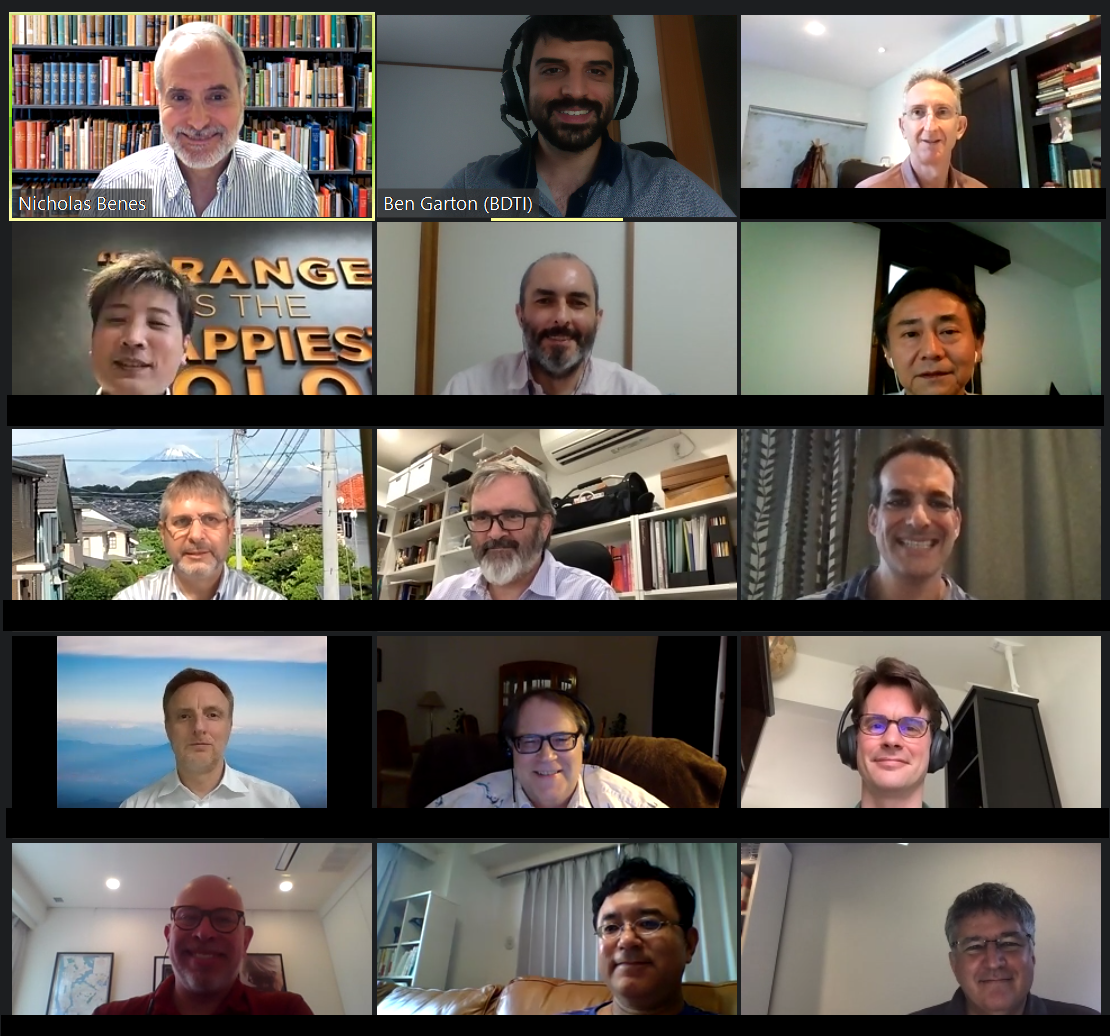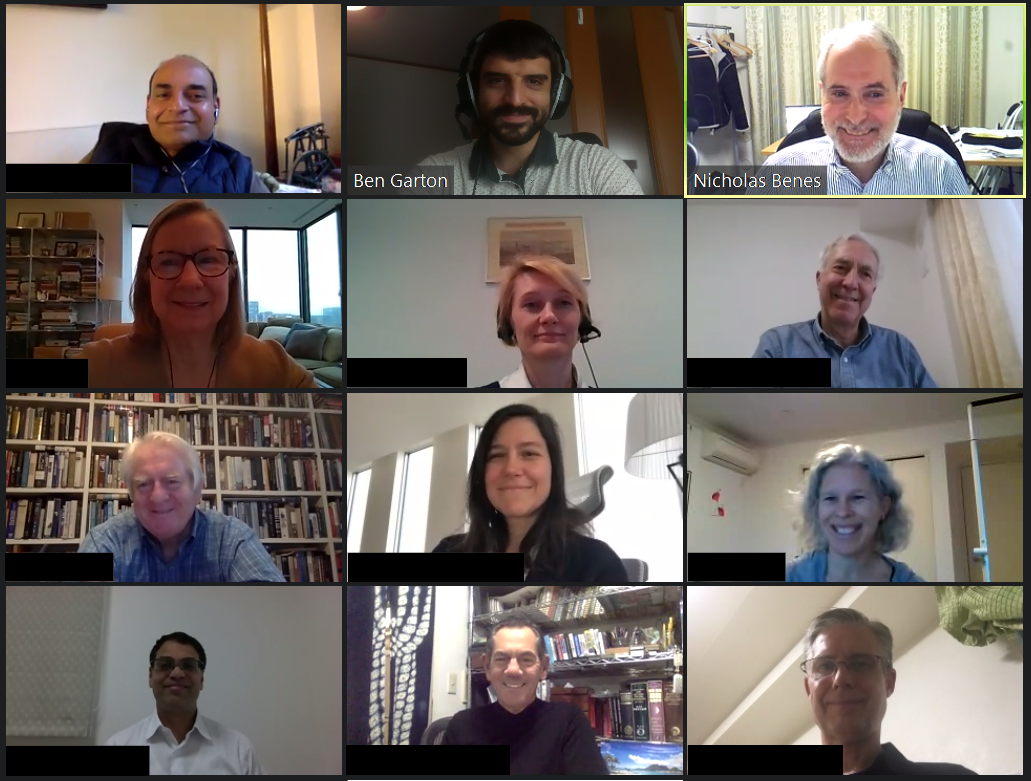Our office will be closed between Aug. 11 and 14 for summer break.
We will resume our business on Aug. 17 (Mon).
We apologise for the inconvenience.
Thank you for your kind understanding.
Our office will be closed between Aug. 11 and 14 for summer break.
We will resume our business on Aug. 17 (Mon).
We apologise for the inconvenience.
Thank you for your kind understanding.

On July 3rd, in the midst of the Corona virus pandemic, BDTI held its English Director Boot Camp via a teleconference arrangement. The day-long intensive course was attended by 12 highly-experienced participants, including one Chief Digital Officer, one Consultant, one Managing Director and senior executives. The participants heard lectures about corporate governance by Nicholas Benes, and Andrew Silberman of AMT, and exchanged experiences and opinions. Despite the IT challenges everything went smoothly, with breaks for everyone to stretch their legs or review materials in more depth.
We are planning to hold the next course on Thursday, September 3, 2020. Sign up early! Please see a description of our director training course here or click the button below for further information.

By Nicholas Benes
(also published in the Harvard Law School Forum on Corporate Governance)
The Birth of the Corporation: Public Interest Organizations
The evolution of the modern corporation is the fascinating story of a series of self-serving legal and societal mutations over hundreds of years, which have morphed the original concept and endowed corporations with freedom of activity, rights, and limitations on liability that would shock their original “inventors”.
As we all know, for many years most corporations were established by way of an exceptional “charter” by a sovereign, granted only in specific cases where: (a) large amounts of capital were needed (b) to conduct investments and activities that served public or national interests and had good profit potential, but (c) where the risks were so large that few parties would invest if their risk were not shared with many others and/or limited to the amount of money they invested.
In the 1600s and 1700s, the activities that sovereign nations felt met those requirements were the exploration of foreign lands on the other side of the globe, the creation and administration of colonies there, and conducting lucrative trade on long (and dangerous) sea routes to and from those colonies. Thus, the most well-known early corporations include organizations such as the British East India Company (the original “too-big-to-fail company), The Dutch East India Company, the Hudson’s Bay Company, and companies to construct the Erie Canal.
As the industrial revolution gathered steam, the need to raise large amounts of capital increased many times over. Driven by this need, the immense benefits of corporate status for raising financing became increasingly obvious and desirable to investors and managers: easy stock transferability vs. rewriting partnership agreements, separation of ownership from control, legal personhood that simplified large transactions such as loans and large investments (a single counterparty to deal with and sue), and the possibility of receiving a charter that conferred “limited liability” on shareholders. All of these made it much easier to raise funds in large amounts than any other form of business organization.
Why wade through 100+ pages of unusable PDF-formatted Japanese jungle, when you can jump directly to the parts you want, read them in English, and quickly cut and paste both text and tables you want to analyze and compare? Why not save 70% of your time and conveniently review the official source documents submitted by all 3,600+ Japanese listed companies? Click on the center of the image below to view in full screen “flipbook” mode, and contact us at info@bdti.or.jp if you are interested to know more. Qualifying parties may receive demonstrations and trial accounts.
Ready or not, Japanese disclosure has now entered the age of machine-readable digital data! The dream that I presented to Japanese lawmakers in February of 2014 [1] can now be realized: a world where a Corporate Governance Code requires detailed disclosure of the inner workings of companies’ governance black boxes, and that information is seamlessly available to all investors, thus making it possible for them to do the analysis they must do to be good “stewards”. As a result, the Stewardship Code will be able to function in reality, not just in theory.
[1] 2月6日に自民党の日本経済再生本部の金融調査会に呼ばれて、コードの概念、政策としての位置付け、入れるべき内容の例を「日本経済の復活のため、コーポレート・ガバナンス・コードの早期制定を」というプレゼン資料を使って説明した。その後、議員らにさまざまなアドバイスと提供させていただいた。

On April 20th, in the midst of the Corona virus pandemic, BDTI held its English Director Boot Camp via a teleconference arrangement. The day-long intensive course was attended by 10 highly-experienced participants, including two Ambassadors, one General Counsel, and senior executives. The participants heard lectures about corporate governance by Nicholas Benes, and Andrew Silberman of AMT, and exchanged experiences and opinions. Despite the IT challenges everything went smoothly, with breaks for everyone to stretch their legs or review materials in more depth.
We are planning to hold the next course on Wednesday, July 8, 2020. Sign up early! Please see a description of our director training course here or click the button below for further information.
According to the FSA on the 10th, the Financial Services Agency will postpone the deadline for submitting annual reports for the companies closing in March for three months, until the end of September, considering the effects of the new corona virus. The coucil composed of the Japan Institute of Certified Public Accountants, Tokyo Stock Exchange and Keidanren announced on the same day. It is expected to be officially decided next week. Financial Services Agency has begun to consider postponing the deadline for submitting annual reports required for listed companies, including the reporting of companies as of end of March and quarterly reports of companies as of end of December last year.

The current Whistleblower Protection Act was enacted in 2004 and was enforced in 2006. It was said that the scandals of the recall cover-up by Mitsubishi Motors and the disguised beef origin by Snow Brand Foods brought the new Act. However, from the beginning, it was criticized that the range of target facts was too narrow, prevention measures for retaliation were not effective, etc. Based on the supplementary resolutions of the Diet and the supplementary provisions of the Act, the Consumer Commission Whistleblower Protection Special Research Committee was established, and discussions were underway for revision. However, the speed was very slow. The Committee finally issued the report in December 2018. Public comments were solicited for the new appendix table to the Act regarding the target laws. The amendment bill was approved by the Cabinet on March 9, 2020. It is now planned to submit to the National Assembly.
To All of BDTI’s Supporters and Participants
Thank you for your support of our many programs and activities at BDTI. As you know, many organizations are switching to telework, and so we think now is a good time for companies to use the transition to telework as an opportunity to train managers in low-cost ways–for example by purchasing our “unlimited-use” e-Learning. ( https://bdti.or.jp/en/e-learning/ ) For a low price of 300,000 yen, the “unlimited use” e-Learning package enables all employees (any number!) at a company or its subsidiaries to learn the most important aspects of the Companies Law, Securities Law, and Corporate Governance (general module, and practice module). This is a total of almost 10 hours of instruction which can be done at one’s own pace at home, and–if we say so ourselves–is very good value for money.
Starting tomorrow, we will be leading by example as we move to a telework arrangement for all of our employees. Someone (myself) will remain in the office during most regular working hours to answer the phone and all employees will be able to respond to your e-mail communication in a normal manner. As we transition to this new working arrangement, we do ask for your patience and understanding and apologize in advance for any inconvenience.
Additionally, you may look forward to several webinars and online training opportunities over Zoom which we will announce as plans are finalized.
“IFP’s challenge, however, highlighted weaknesses at Kirin, whose expansion has produced mixed results, analysts said. One of the director nominees recommended by IFP, corporate governance expert Nicholas Benes, won 35% of shareholders’ votes despite opposition from Kirin, suggesting some shareholders agreed the board needed more change.

Prime Minister Abe’s requests to close schools nationwide, tele-work from home, and cancel sports events and public gatherings, have caused a great deal of strain on working mothers. More than ever before, now is the time when the Government of Japan (the GOJ) should be accelerating its stated policy to allow Japanese households to sponsor Foreign Domestic Workers (FDWs).
Women are being encouraged by the government to enter the labor force, with the expectation that they will become executives and join Boards of Directors. If the government expects to reach its own goal for women to constitute 10 percent all corporate directors during this year (2020), it will need to rapidly increase the range of “options” that women have for childcare and elderly care.